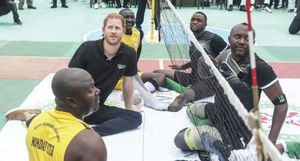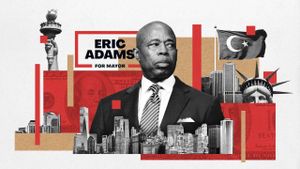Bill Gates graced the much-anticipated episode of Che Tempo Che Fa aired on February 9, where he discussed launching his new book, Source Code – I miei inizi, alongside Carlo Conti, who is gearing up for the prestigious Sanremo Festival.
Stationed on Nove, the hit Italian talk show, hosted by Fabio Fazio and featuring Luciana Littizzetto and Filippa Lagerback, welcomed one of the world's most influential billionaires. Gates' memoir, which hit shelves on February 4, is the first of three autobiographical volumes detailing his transformational life from childhood to becoming the co-founder of Microsoft.
The episode strategically coincided with the onset of the renowned Sanremo music festival, drawing attention not only for musical talent but also for significant cultural intersections. Alongside Gates, Conti shared the stage to discuss the festival's excitement just two days before its commencement on February 11.
Gates reflected on his beginnings, describing his supportive parents, particularly crediting his mother for instilling high expectations and fostering his inquisitive nature. He shared, "I was fortunate to have fantastic parents. My father was my example, always calm and wise, and my mother's expectations shaped me significantly." Such insights served to resonate with fans beyond his corporate persona, offering glimpses of the human side behind the tech mogul.
During the interview, Gates’s admiration for tennis sensation Jannik Sinner surfaced, as he stated, "I believe Sinner is incredible; among young players, he is absolutely my favorite. He is truly amazing, wonderful, never loses his cool. I appreciate his always positive attitude, he is really a star." While discussing Sinner's talent, Gates illustrated how uplifting attitudes contribute to success, illustrating clear distinctions against contrasting personalities like Nick Kyrgios.
Further emphasizing his commitment to global issues, Gates casually mentioned his readiness to advise political figures, including former President Donald Trump. He expressed concerns over Trump’s approach to science, saying, "I told the President Trump, questioning everything can be good, but it can also be bad. I can help him with my experience at the Foundation, especially with HIV efforts." This calm, measured response highlighted Gates' efforts to navigate the political maze without succumbing to divisive rhetoric.
Despite prevailing political tensions, Gates expressed optimism about future collaborations between science and political powers, remarking on his belief in the potential benefits of international organizations like the WHO, especially after Trump’s administration's withdrawal. "The most constructive role I can have is speaking to both sides. There will be future pandemics and the WHO has a key role, thinking only about the work currently done on eradicatiing polio,” Gates remarked, noting the importance of concerted efforts for global health.
Beyond political discourse, the episode cultivated interest with storytelling sessions, including notable figures such as Ilaria Salis and Edoardo Bove, intertwining sport, activism, and the arts. Conti confirmed Bove’s participation at the Sanremo Festival and looked forward to the courage required to share his experiences following his recent health scare during the Fiorentina-Inter match.
The discourse within Che Tempo Che Fa not only provided entertainment but served as a platform for various voices to echo societal issues, bridging light-hearted entertainment and grave global challenges. The core message radiated through Gates' humble yet impactful narrative, inspiring viewers to perceive the importance of generosity and community amid pressing global concerns.
The evening concluded with the audience’s laughter and heartwarming moments as Fazio guided conversations, light-heartedly introducing guests like Al Bano and others at the iconic Che tempo che fa - Il Tavolo segment, reminding viewers of the vibrant entertainment industry embedded within these serious discussions.



